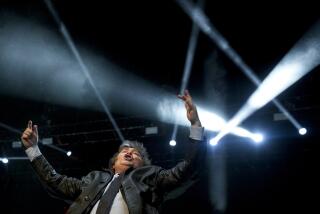Alfonsin Replaces Army Chief in Wake of Mutiny
BUENOS AIRES â Argentine President Raul Alfonsin followed a dramatic Easter victory over military mutineers Monday by shuffling the command structure of his troubled armed forces.
Alfonsinâs army commander, Gen. Hector Rios Erenu, who had proved unable to suffocate the vest-pocket rebellion by disaffected officers, was retired at his own request, the government announced. Eight other generals are also being retired at their request, a government communique said late Monday.
Alfonsin thus was faced with the challenge of finding a new commanding general loyal to the government but also able to effectively command a disciplined institution afflicted with sagging morale and deeply preoccupied with its past and its future.
After a day of consultations, Alfonsin named Gen. Jose S. Caridi, until Monday the armyâs fourth-ranking general, as the new commander. Caridi, a 56-year-old bachelor, is an artillery officer who had been the armyâs inspector general.
âI am assuming a tremendous responsibility at a very difficult moment for our institution,â Caridi told reporters after a swearing-in ceremony Monday night.
Rios Erenuâs departure had been a principal demand of rebellious officers, and their rebellion in turn demonstrated his inability to control them.
The mutineers had called for the appointment of a general far down on the promotion list, but Alfonsin ignored them, selecting instead one of the most senior generals. The general named by the rebels as their choice for the commanderâs job was one of those retired.
Well-placed Argentine analysts concluded Monday that while Alfonsin had acceded to the rebelsâ demands for a new army commander, he nevertheless emerged as the clear victor in his confrontation with them, along the way sparing the country a bloody confrontation that would have produced no winner.
In a gesture of high drama and presidential machismo, Alfonsin personally confronted the mutineers Sunday at a suburban military base where they had occupied an infantry school in a revolt that began four days before.
However, in the battle over Argentinaâs young and uncertain democratic system, the real victors were the people, Argentine commentators stressed Monday.
Alfonsin Applauded
By the hundreds of thousands, in crowds organized by rival political parties who found themselves suddenly allied and in informal family groups, they poured into the streets of Buenos Aires and provincial capitals to shout their approval for Alfonsinâs determination to preserve constitutional government.
In the distant Andean province of Salta, the governor warned at the height of the mutiny that the province would not accept any federal authority outside the existing constitution.
âThis demonstration is the sum of all civilian aspirations embraced in the common idea of constitution, law and justice,â said Eduardo Angeloz, governor of the central province of Cordoba after a pro-Alfonsin rally that drew 100,000 people.
Revolt Began Thursday
The revolt began in Cordoba last Thursday when an army major accused of having directed a clandestine army torture center called La Perla refused to appear in court and found refuge with a paratroop regiment. The major and the officers who sheltered him have been cashiered. The general commanding the military region was retired.
The rebels said they never intended to trigger a coup against Alfonsin. At any rate, the massive outpouring in his defense made a coup impossible and perhaps also short-circuited uprisings by other units.
âThe people in the streets said ânoâ to (military) impunity with the same force with which they demanded no bloodshed,â said Adolfo Perez Esquivel, a Nobel Peace Prize winner who is one of Argentinaâs leading human rights activists. âTheir demand was for peace and equality before the law.â
The content of Alfonsinâs discussion with the rebelâs leader, Lt. Col. Aldo Rico, was not disclosed by the government, but Rico later told reporters that the rebels had reached âan agreementâ with Alfonsin as the armed forces commander in chief.
Rico, held in detention Monday at the big Campo de Mayo base northwest of the city with at least two other colonels who also face charges, contended as well that his mutiny âgained objectives affecting the armed forces and police.â The remark was viewed as an oblique reference to rebel demands of amnesty for military and police officers accused of human rights violations during the seven-year military government that preceded Alfonsinâs.
The government, which has pressed human rights cases but won congressional approval for a deadline last February against filing new charges, said there had been no negotiations between Alfonsin and the rebels.
In a position shared universally by officers of Argentinaâs armed forces, the rebels insisted that officers not be tried for carrying out the orders of their superiors.
In the next few weeks, the Argentine Supreme Court is expected to rule on a finding by the attorney general that reportedly distinguishes between those who gave the orders, those who carried them out consistent with their commands and those who committed abuses on their own.
Thus far, 10 members of the military and police have been sentenced in human rights cases arising from the so-called âdirty warâ against Marxist terrorists and their sympathizers between 1976 and 1980. In addition, charges are pending against about 200 active and retired officers and men.
More to Read
Sign up for Essential California
The most important California stories and recommendations in your inbox every morning.
You may occasionally receive promotional content from the Los Angeles Times.










